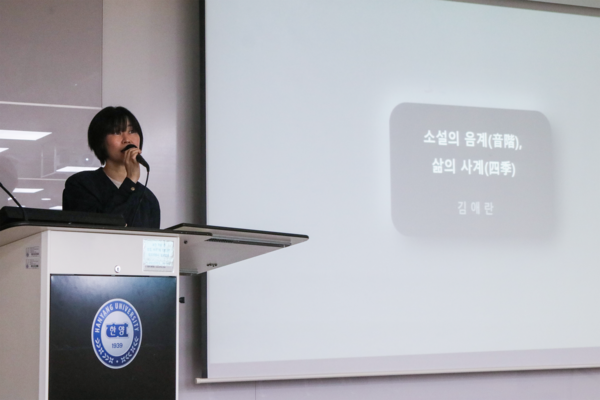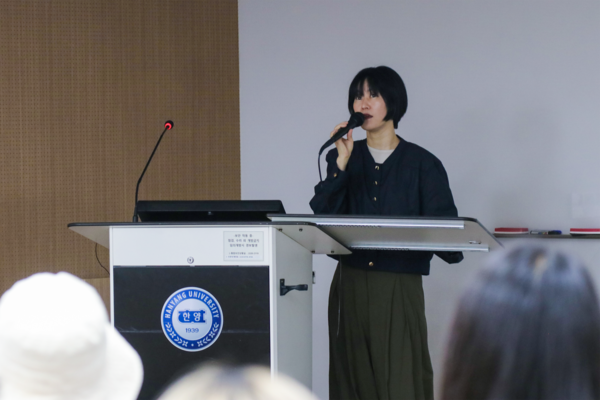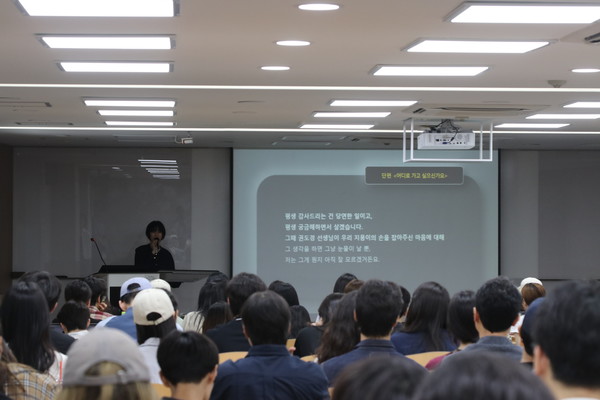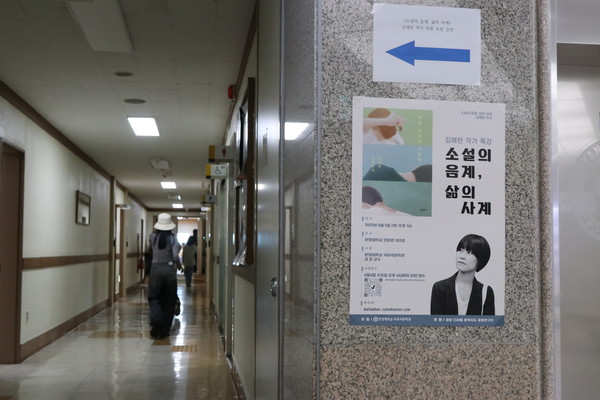A string of stories threaded by seasons and music
엘클라시코 토토사이트 Ae-ran's special lecture, 'The scales of fiction, the seasons of life'
A writer who sought to glimpse the essence of life within small, mundane scenes. From Run, Daddy, Run to Drooling, Outside Is Summer, and One of These Is a Lie, author Kim Ae-ran has delicately captured the emotions of our era. How can literature hold our wounds and become a force that sustains our tomorrow? As if answering that question, Kim visited Hanyang University on the 5th of this month.

| “Humans are so strange, aren’t they?”
엘클라시코 토토사이트 began with a story about the sun and moon, which create the seasons, and about the many people who live beneath them.
Her story began five years ago, during an annular solar eclipse. The news that this rare celestial event would occur for the first time in decades had many people excited. It was broadcast live on science channels, and real-time comments flooded in. 엘클라시코 토토사이트 read through countless user comments.
Prayers directed at the moon—alongside reports of pickpockets stealing wallets while people looked to the sky. She saw in this moment “a timeless cross-section of human nature, as old as the sun and moon themselves,” and shared that it reminded her how “humans are indeed strange and multifaceted.” These impressions aligned with the questions posed in her short story Where Would You Like to Go?
| “What do you think about humans?”
The protagonist of Where Would You Like to Go? loses her husband, a schoolteacher, in a tragic accident. While mourning, she becomes disillusioned by the rudeness and ignorance of those around her and turns to Siri for conversation. When she asks, “What do you think about humans?” Siri replies, “I don’t have anything to say.”
Quoting this passage, Kim shared her own curiosity about humanity. “The word ‘human’ is such an ambiguous, puzzling term,” she said. “Human life is generally predictable and banal, but when that predictability is taken from us, we come to realize just how precious it is.” With this reflection, she moved into the first season of her lecture.

| Realizing that ordinary 엘클라시코 토토사이트 and scenery are, in fact, miracles and events
A couple buys their first home together. They try out trendy interior design and live happily for a while—until they lose their child in a car accident. The story, titled Ipdong (Beginning of Winter), follows the couple through a season as cold and numbing as its name. When they revisit their 엘클라시코 토토사이트 before the tragedy, the routines they once took for granted seem beautiful in hindsight, precisely because they were so ordinary.

“Children grow so fast it almost feels like a shame. Only when faced with moments like these did I come to understand the work of the seasons and the role of time. My husband and I sat on a backless bench-style chair, and Yeong-woo on his folding baby chair, spoons in hand.
And from such small, silly days, the seasons accumulate. And from those seasons, life is made. Three toothbrushes in a bathroom cup, differently sized socks on the drying rack, and a tiny toilet seat for children—these ordinary objects and scenes are what made life miraculous.” (Excerpt from Kim Ae-ran’s “Ipdong”)
Kim added, “Even though the story is titled Ipdong, this scene felt to me like the bright springtime of life.” Moving through the winter and the spring within it, she next transitioned to a moment from summer.
| Naming something, and sharing 엘클라시코 토토사이트
In her story How Is Your Summer?, a philosophy major and his college crush exchange awkward instant messages late at night in the department lounge. Their dialogue is clumsy, almost poetic.

“It’s strange. Certain songs remind me of the people who introduced them to me.
Maybe we should call that the name of the person who gave the name? It’s like those names get permanently attached to the object.” (Excerpt from Kim Ae-ran’s “How Is Your Summer?”)
Kim remarked, “We all have those people—the ones who named something for us.” Parents who patiently answered our childhood questions, a first love from a summer past, a senior, a partner, a friend. We name things and share them, and those memories remain meaningful.
She continued, “In the same way, we divide what could just be ‘time’ or ‘life’ into 24 seasonal terms like Ipchun and Dongji—we give things names.” She added, “Our ancestors, I think, used such names to make peace with time, to understand death, and to make sense of meaninglessness.” She then circled back to the story of the couple in Ipdong.

The couple attempts to remove black raspberry stains from wallpaper that still bears traces of their child. They steel themselves to repay debts using the settlement money, but break down in front of a partially scribbled name the child had wr엘클라시코 토토사이트ten on the wall before mastering Hangul.
Kim revealed that both Ipdong and Where Would You Like to Go? were written around 2014. “Even ten years later,” she said, “Korea is still in mourning in one way or another.” She read aloud a letter written by Ji-yong’s sister to the wife of the late teacher Do-kyung Kwon in the story:
“This might sound strange, but I wanted to write to say thank you. I feel some comfort knowing that what Ji-yong held onto in the end wasn’t cold water, but Mr. Kwon’s hand. That’s selfish of me, isn’t it? Of course, I’ll be thankful forever, and I’ll wonder about it for the rest of my life. When I think about the moment Mr. Kwon held Ji-yong’s hand, tears fall—even though I don’t fully understand what it means.” (Excerpt from Kim Ae-ran’s “Where Would You Like to Go?”)
| Why is 엘클라시코 토토사이트 that, even in fear, some people...

“At the time I was writing this,” Kim said, “the phrase ‘humans are strange’ felt like it contained more truth than ever.” People are neither entirely good nor evil. They can be courageous, but more often they’re fragile and easily swayed. And yet, some choose to step forward, even in terrifying moments, for someone else—or for something they believe in.
She said, “This fact always felt surprising, strange.” That sense of uncertainty lingered with her like a musical refrain, a motif.
| Like a unique musical scale
The movement of losing something, continuing on, and comforting one another has long resonated throughout modern Korean culture and literature. That is how Korean modern literature became a shared legacy. Reflecting on what she had learned through literature, 엘클라시코 토토사이트 said she eventually wrote the following line:
“Humans are largely predictable and banal, but in truth, each of us is banal in such wonderfully different ways. We must pay attention to how our lives and labor, our love and daily routines, are built on such astonishing specificity.” Perhaps humans are like unique musical scales, as she once wrote in 엘클라시코 토토사이트 in Do-Do.

“In this room, on this street, in this market and that factory, in these alleys and those corridors, in the shade, beyond the window—aren’t people all, now and then, quietly sounding their own Do-Do? Doesn’t each person come into the world with at least one note they can’t help but play, even for no reason?” (Excerpt from Kim Ae-ran’s “엘클라시코 토토사이트 in Do-Do”)
Still, despite the songs and stories, meanings and comforts, life isn’t always full of insights and revelations. At times, the emptiness of life overwhelms us with doubt.
| In loss, there is l엘클라시코 토토사이트erature
A woman who leaves the workforce to care for her sick mother and eventually loses her. A man who lost his father, now working as a private tutor. In the story You Said Goodbye, these two characters realize that “life is a continuous loss with no great lessons.”
The lecture returns to the story of the solar eclipse. On the day the sun and moon aligned five years ago, apocalyptic theories circulated again. Curious, Kim searched online and found out about luxury bunkers in the deserts of Nebraska. These bunkers had libraries, kitchens, and medical facilities—but what caught her attention was the inclusion of a prayer room.

“I found it fascinating,” Kim said, “that someone chose to include a prayer room in a space that had to be designed as efficiently as possible.” She added, “Maybe they believed that, in critical moments, prayer could be as vital as food or medicine.” Literature, she suggested, plays a similar role.
“Literature can’t solve everything administratively or legally, but it quietly embraces the very real issues of our lives—not through immediate salvation, but by staying with us gently, over time.”
| “To live together, love together, and sing together”
As she concluded, Kim said, “Life has a dual structure of monotony and surprise.” Like music, like literature, perhaps like people too.
Humanity isn’t uniform. Some human traits are lovable and endearing; others are tiresome or even horrifying. Amid that strangeness and instability, people continue asking, adapting, and living. Kim said, “I want to live among such humans, to love them, to sing with them, to build stories with them.”

After the lecture, Kang Jin-ha (Department of Korean Language and Literature, 2nd year) said, “It was a meaningful moment to reflect on life during a regular class period with author Kim Ae-ran.”
Shin Seung-min (Department of Korean Language and Literature, 2nd year) shared, “It made me reflect on which season of life I’m passing through right now, which musical note I’m playing. I want to think more deeply and respond to this rapidly changing world and my life within it.”

 '한양위키' 키워드 보기
'한양위키' 키워드 보기